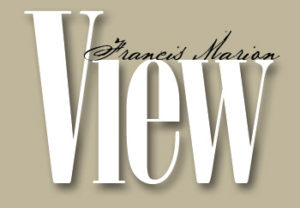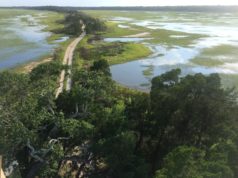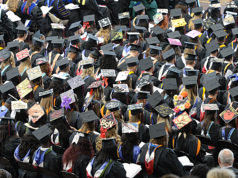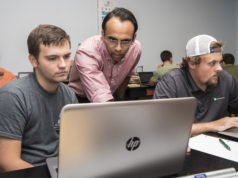In its first decade, Francis Marion University’s Trustee Research Scholars program has helped ‘stoke the fires’ of academic pursuit
It’s hard to find a college professor who doesn’t like teaching, but what draws most people to the profession, at least at some point, is the research; that all-encompassing passion to study a particular topic, to perfect a particular task.
It’s a feeling, says Dr. Jon Tuttle, a professor of English and director of the Honors Program at Francis Marion University, that is the central endeavor, indeed to the life, of the academic.
“It’s what keeps our fires stoked,” says Tuttle. “It’s what keeps us active in our fields, keeps us going.”
For Tuttle, a gifted playwright whose works have been performed on stages across the country, research means writing, publishing, seeing his works performed and – he is quite forthright about this – seeing his name up in the proverbial lights.
“You never get tired of seeing your name, article, or play in print,” says Tuttle. “You never get to the point where that’s not thrilling. The thrill is what keeps you pushing ahead.”
But, how to keep the thrill alive?
It is no easy question, but it’s one Francis Marion University has worked to answer over the past decade with its Trustee Research Scholars Program.
Some free time
Founded in 2002 under the direction of FMU President Fred Carter, the Trustee’s Scholars program recognizes faculty members’ scholarship and research by giving them a little extra cash, some additional free time to pursue their passion for a field of study, and, to Tuttle’s point, some affirming recognition among their peers.
Research Scholars at FMU serve three-year renewable terms, with new scholars named as others retire. The program is limited to 12 faculty members – it’s been expanded to that number over time – who are chosen by Carter, the faculty chair (currently Dr. Rebecca Flannagan), and FMU Provost Dr. Richard Chapman.
During its first decade in existence, the program has given greater visibility to the faculty’s scholarship, and has signaled the administration’s interest in fostering true research at a university long lauded for its teaching acumen. Chapman says the scholar’s program has greatly increased campus awareness of the importance of scholarship and research, and has fulfilled its primary role of promoting scholarly pursuits.
“By rewarding scholarly activity, the program encourages our faculty to develop and pursue an active research agenda,” Chapman says. “That benefits the university in myriad ways.”
Chapman says that one of the program’s strengths is recognizing outstanding creative and artistic productivity, as well as acknowledging more traditional academic and scientific research. For this reason, scholars include faculty from all backgrounds and disciplines. Though not necessarily the aim of the scholars program, that’s been useful in giving FMU’s research push an inclusive feel.
Lynn Kostoff, Professor of English and Nellie Cooke Sparrow Writer in Residence, was recognized as a Research Scholar in 2011. He is the author of three novels, A Choice of Nightmares, The Long Fall, and Late Rain, with a fourth novel, Words to Die For, scheduled for publication in April. As a Research Scholar, Kostoff says the reduced teaching load – he teaches three classes a semester — as the greatest benefit. His “research” is, of course, related to the writing of new novels.
“Teaching has always been my top priority — and it still is,” says Kostoff. “Before being named as a Research Scholar, I was writing novels, but also working hard to be a good teacher. The reduced teaching load means I have fewer papers to grade, less reading for classes, and more time to write.”
Tenure track professors at Francis Marion typically teach a “3-4 load,” that is three courses one semester and four another.
Non-tenure track faculty teach four each semester. The Research Scholars load, then, is reduced by one course over the standard academic, but it may feel like more because it allows for a standardization of the load from year to year.
Kostoff notes that this has helped him stick to his plan of writing one novel draft per year. He usually completes four drafts before submitting his work to his agent, so his publishing schedule has become more regular.
Kostoff’s free time isn’t spent just on writing. Since the protagonist in his latest novel, The Head Start, works as a probation officer, Kostoff spent a considerable amount of time researching the probation and parole systems to ensure the novel’s details are accurate.
Shooting a pig
Fellow Research Scholar Dr. Scott Kaufman, a professor of History at FMU, has utilized the extra time afforded by his scholar status to write, travel, and to conduct and transcribe interviews. Kaufman is currently writing two books and editing a set of essays about former presidents Jimmy Carter and Gerald Ford. He recently interviewed President and Mrs. Jimmy Carter, as well as members of Carter’s and Ford’s administrations.
Kaufman says that while gaining some relief from his teaching load helps his research, his research into diplomatic relations and presidential history helps him teach more effectively.
“Teaching and research are very much related,” says Kaufman. “History is telling a story with analysis, and research allows you to deeply understand issues and offer new and exciting interpretations for the classroom.”
For example, Kaufman has transferred research on the Pig War, an 1859 Canadian border dispute between the United States and the British Empire that was triggered by the shooting a pig, into a dynamic classroom experience for students. In a classroom exercise developed by Kaufman, students analyze documents Kaufman found while performing his research, and attempt to determine which sides were telling the truth during the conflict … and which side was bending it. The exercise provides students with an interactive and collaborative way of learning. They wouldn’t have that opportunity without the primary source documents Kaufman makes available, and Kaufman wouldn’t have those documents if he wasn’t doing the research work. … which he might not have time to do if not for the Research Scholars program.
Dr. Lisa Eargle, Professor of Sociology and one of the newest Trustee Research Scholars, balances her teaching and research with her duties as chair of Department of Sociology and the administration of the Sociology internship program.
Eargle’s research focuses on disasters such as the 2010 BP oil spill in the Gulf of Mexico and 2012’s Hurricane Sandy. Her book, Black Beaches and Bayous, was published in 2012. She has another book, Savage Sand and Surf, pending publication in 2015. Since the Pee Dee is subject to hurricanes, her research has local implications.
Eargle says she’s grateful to be honored as a Trustee Research Scholar, but says her dogged pursuit of scholarship probably wouldn’t end without it.
“I’ve been a professor for 18 years and received many rejection letters from research and publications,” says Eargle. “It’s disheartening, but I’ve stayed dedicated to my research and had faith. We are a community of learners, and I’ve put what I’ve gained from teaching right back into my research.”
To make the most of her time, Eargle manages her hectic schedule using a paperback planner that she reviews at least twice a day. She also staggers class deadlines and due dates, and often works through lunch.
According to Chapman, a tremendous work ethic — like Eargle’s — is one factor that distinguishes Research Scholars, and is something the university is happy to recognize and promote.
“Our Research Scholars are gifted teachers and scholars who work hard and are extremely productive,” he said. “Some are department chairs and others have community responsibilities, but all of their classes are well taught and they’ve learned to balance the demands of teaching, administrative responsibilities, and research.”
Chapman says that the Research Scholar program benefits everyone in the university community, including alumni, because it reinforces the significance of a degree from Francis Marion University, whether that degree is earned in the past, present, or future.
“All of our Research Scholars have carved places for themselves in their disciplines,” says Chapman. “Their research is recognized throughout the southeast and the nation, and this enhances our university’s reputation.”
The New Class of Scholars
Francis Marion named four new Trustee Research Scholars in the Fall of 2014. Here’s a look at the latest faculty to be honored:
Dr. Lisa A. Eargle
Professor of Sociology
Dr. Lisa A. Eargle is a native of Blythewood, S.C. Her research interests include local economic development and prosperity, environment and hazards, crime/deviance, and education. She is a national authority on the sociological effects of natural disasters.
Dr. Christopher D. Johnson
Professor of English
Dr. Johnson is a native of Allamuchy, N.J. His research is focused on 18th-century fiction, with particular interest in John Dryden, Jonathan Swift, Henry Fielding, Sarah Fielding, and Oliver Goldsmith.
Dr. Derek W. Jokisch
Professor of Physics
Dr. Jokisch is a native of Carlinville, Ill. His research interests include medical physics, nuclear engineering, radiation protection, nuclear medicine, radiation dosimetry, and radiation biology.
Dr. Terry Roberts
Professor of Music
Dr. Roberts is a native of Oklahoma City, Okla. Dr. Roberts is an accomplished soloist (the French Horn is his primary instrument) and has performed around the world as both a chamber and orchestral musician.
Current FMU Board of Trustees’ Research Scholars include Jeff Camper (biology), Fred David (business), Lisa Eargle (sociology), Scott Kaufman (history), Christopher Johnson (English), Derek Jokisch (physics), Scott Kaufman (history), Lynn Kostoff (English), Jeff Lee (education), Larry McCumber (biology), Leroy Peterson Jr. (chemistry), Terry Roberts (music) and Jon Tuttle (English).
Retired Research Scholars include Drs. John Britton (political science), E. Lorraine de Montluzin (history), William Fox (mathematics), Jeffrey Pompe (business), William Ramsey (English), and Benjamin Woods (music).





